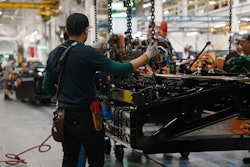
According to J.D. Power, the study measures customer perceptions of 2011 model-year Class 5, 6 and 7 gasoline- and diesel-powered engines and provides manufacturers with a comprehensive and objective measure of customer satisfaction and product quality.
J.D. Power says eight attributes are measured to determine overall engine satisfaction: engine reliability and dependability; ease of access for service or maintenance; maintaining speeds on grades; acceleration when fully loaded; control module (ECM); vibration at idle; engine warranty; and average fuel economy.
Overall, the study says the number of engine and fuel problems has decreased to 40 problems per 100 trucks (PP100), down by 11 PP100 from 2011. While the number of problems has decreased, the average length of unscheduled downtime due to these problems is 13.4 days, an increase of 2.7 days from 2011.
“As engine manufacturers continue to make advances in technology, there will likely be fewer problems,” says Brent Gruber, director of the commercial vehicle practice at J.D. Power and Associates. “However, the trade-off is that when problems occur, they will likely be more complicated and require more downtime to fix.”
The study finds that overall satisfaction with medium-duty truck engines is 760 (on a 1,000-point scale), and increases to 778 when selective catalytic reduction (SCR) technologies are used to meet emission requirements.
J.D. Power says satisfaction varies among the different classes of trucks, with an 11-point gap in satisfaction between the highest- and lowest-scoring classes. The greatest difference among the three truck classes is the number of reported PP100, with considerably fewer engine problems reported for Class 5 trucks, compared with Class 6 and Class 7 trucks, the study says.











